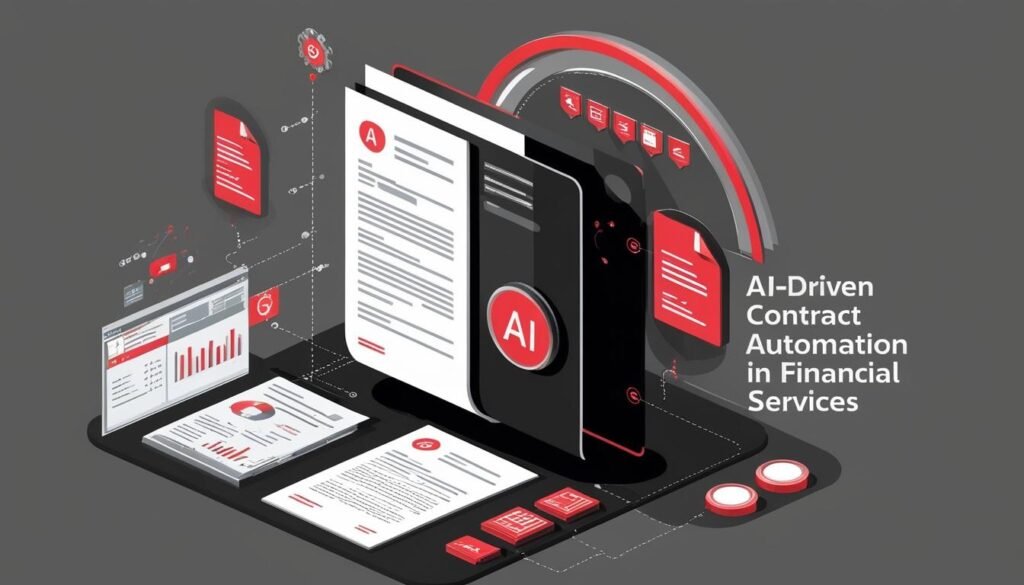The integration of AI in contract management is enhancing efficiency and accuracy, transforming traditional processes in the financial sector.
In recent developments within the financial services sector, the adoption of contract automation, driven by artificial intelligence (AI), is reshaping how institutions handle contracts. Traditionally, contract management involved intricate processes that were not only time-consuming but also fraught with risks stemming from human error. However, the integration of AI technologies is addressing these challenges by enhancing efficiency and accuracy across various contract-related tasks.
Contract automation refers to the use of software tools that enable the creation, management, and execution of contracts with minimal manual effort. These tools employ AI and machine learning to analyse data, identify patterns, and automate several critical tasks, including document generation, clause extraction, and compliance checks. As financial institutions navigate a landscape filled with complex agreements and stringent regulatory requirements, the necessity for such automation is growing.
The financial sector processes a substantial volume of contracts daily, including customer agreements and vendor contracts. This traditional method of contract execution is often resource-intensive and susceptible to human errors that could lead to significant financial repercussions. As regulations evolve, institutions must quickly adapt their contracts to remain compliant, a failure that could result in serious fines or reputational harm.
AI-driven contract automation shows promise in several areas, offering key benefits that include:
-
Time Efficiency: The time taken for manual contract processes can range from days to weeks. AI automation significantly reduces this period, with predefined templates and workflows facilitating contract drafts, reviews, and approvals in a matter of minutes.
-
Cost Savings: Automation leads to a decrease in administrative costs through reduced manual intervention and minimised errors that could result in disputes or penalties.
-
Enhanced Accuracy: AI contributes to the precision of contract creation by cross-referencing terms with legal standards, reducing ambiguities and improving enforceability.
-
Improved Compliance: Continuous monitoring of regulatory changes via AI tools ensures that contract terms are up-to-date, lowering the risk of non-compliance.
-
Streamlined Workflows: Automated systems can integrate seamlessly with other business tools, enabling end-to-end automation. This allows financial institutions to link loan agreements with customer databases, payment gateways, and regulatory platforms.
-
Better Customer Experience: Expedient processing times and fewer errors ensure a smoother customer experience, allowing institutions to respond quickly to client needs, thereby fostering trust and loyalty.
AI enhances contract automation further through advances in technologies such as Natural Language Processing (NLP) and machine learning. These AI capabilities allow for automatic extraction and summarising of contract terms, risk identification, and predictive insights that improve future contract negotiations.
While the advantages of contract automation are evident, the implementation of such technologies is not without challenges. Important hurdles include ensuring data security and privacy, particularly since contracts often contain sensitive information. Additionally, many institutions still rely on outdated legacy systems that may not seamlessly integrate with modern automation tools, leaving them with potential high costs for upgrades.
Resistance to change among employees and stakeholders may also impede the transition to AI technologies, as concerns regarding job security and unfamiliarity with new processes arise. Furthermore, the initial costs associated with AI tools and training can be substantial, despite offering long-term savings.
To address these challenges, experts suggest several best practices for adopting contract automation. Institutions are advised to start small by automating repetitive tasks and progressively shift towards more complex processes. Investment in employee training is crucial to alleviate fears surrounding AI and highlight how these tools can complement existing roles. Ensuring robust security through suitable automation solutions with advanced features is essential for protecting sensitive data. Lastly, partnering with technology specialists can facilitate a smoother implementation process.
Looking towards the future, trends within contract automation for financial services appear promising. Advancements in AI and related technologies are poised to enhance contract negotiations, utilising predictive analytics to forecast contract performance and effectively identifying areas for improvement. Voice-activated contracting is also expected to emerge, allowing users to create and manage contracts through voice commands for expedited processing.
In summary, AI-driven contract automation is progressively transforming the financial services landscape. By simplifying contract processes, mitigating risks, and enhancing operational efficiency, financial institutions that seamlessly integrate these technologies stand to gain significant competitive advantages. As the potential for further innovation continues to expand, contract management is set to evolve from a laborious bottleneck into a streamlined, value-generating aspect of business operations.
Source: Noah Wire Services
- https://techbullion.com/contract-automation-for-financial-services-simplifying-agreements-with-ai/ – Corroborates the concept of contract automation, its benefits, and the role of AI in enhancing efficiency and accuracy in financial services.
- https://techbullion.com/contract-automation-for-financial-services-simplifying-agreements-with-ai/ – Explains how AI-driven contract automation reduces time and costs, improves accuracy, and ensures compliance with regulatory requirements.
- https://attri.ai/blog/optimizing-financial-operations-contract-intelligence-in-banking-and-finance – Details the challenges of traditional contract management in the financial sector and how contract intelligence solutions address these issues through AI and machine learning.
- https://attri.ai/blog/optimizing-financial-operations-contract-intelligence-in-banking-and-finance – Discusses the integration of automated systems with other business tools, enabling end-to-end automation and improving operational efficiency.
- https://contractpodai.com/industry/financial-services/ – Highlights the use of AI-powered contract management software to drive compliance, efficiency, and cost savings in the financial services sector.
- https://techbullion.com/contract-automation-for-financial-services-simplifying-agreements-with-ai/ – Explains how AI enhances contract automation through Natural Language Processing (NLP) and predictive analytics, improving contract negotiations and risk identification.
- https://attri.ai/blog/optimizing-financial-operations-contract-intelligence-in-banking-and-finance – Describes the real-world applications of contract intelligence in areas such as loan origination, regulatory compliance, and vendor management.
- https://techbullion.com/contract-automation-for-financial-services-simplifying-agreements-with-ai/ – Addresses the challenges of implementing AI-driven contract automation, including data security, legacy system integration, and resistance to change.
- https://attri.ai/blog/optimizing-financial-operations-contract-intelligence-in-banking-and-finance – Provides best practices for adopting contract automation, such as starting small, investing in employee training, and ensuring robust security measures.
- https://techbullion.com/contract-automation-for-financial-services-simplifying-agreements-with-ai/ – Outlines future trends in contract automation, including AI-powered negotiation, predictive analytics, and voice-activated contracting.
- https://contractpodai.com/industry/financial-services/ – Emphasizes the importance of AI-driven solutions in transforming contract management into a streamlined and value-generating process in financial services.


